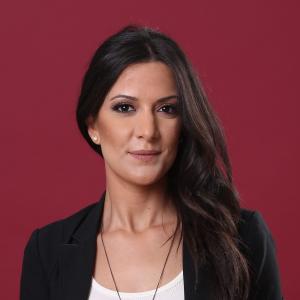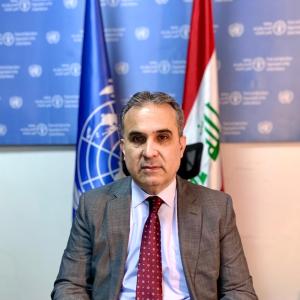FAO Empowers Rural Women to Lead Climate Action in Iraq
١٥ ئایار ٢٠٢٥
Erbil, 14 May 2025 – Building on the momentum of the Climate Wise Women (CWW) Module 1 training held in Basra, the Food and Agriculture Organization of the United Nations (FAO), with funding from the Swedish International Development Cooperation Agency (SIDA), has concluded a six-day Intensive Training of Trainers (TOT) in Erbil. This l training marked a significant milestone in preparing Master Trainers—women leaders from Najaf, Muthanna, and Baghdad—to initiate, demonstrate, and spearhead community-level climate action across southern Iraq.

Delivered under the project “Enhance Climate Resilience of Vulnerable Agriculture Households in Southern Iraq”, the training, delivered by FAO Specialists, combined Modules 2 and 3 of the CWW curriculum into one comprehensive cycle. Participants were introduced to advanced concepts in climate-resilient irrigation and water management, sustainable soil-water-crop relationships, agrometeorological advisories, and resilient food systems technologies. Designed to be practical, locally adapted, and feasible for women smallholder farmers on the ground, the training equipped participants with both scientific tools and leadership skills to support rural women in their farms.
“This training demonstrates that women are at the heart of agricultural transformation in Iraq,” said Salah Hajj Hassan, FAO Representative in Iraq. “By equipping them with the tools and leadership skills to adapt to climate change, we are laying the foundation for resilient communities and sustainable food systems.”
The opening ceremony was attended by Dr. Hadi Al-Yasiri, Director General of the Horticulture Department at the Ministry of Agriculture, and Dr. Mohammed Mankhi, Director General of the Agricultural Mechanization Department. Both officials praised the initiative, emphasizing that empowering rural women with adequate knowledge and capacity to adapt to climate change is a strategic investment in Iraq’s agricultural future, and would foster climate resilience where it is most needed—within local communities."
This training followed earlier steps in the CWW initiative, including the successful TOT and the training of 50 local women facilitators from Najaf and Muthanna. These facilitators, have now established community-based women farmer groups, and will work closely with the Master Trainers to promote climate-smart agricultural practices tailored to the agro-climatic realities of the target communities, as well as to their adaptive capacities.
The training sessions concluded with a closing ceremony, during which the FAO team awarded certificates and celebrated the achievements of the Master Trainers—reaffirming the commitment of all partners to empowering rural women as agents of change in climate action.
With the scientific training phase now complete, the Climate Wise Women initiative is entering its field implementation stage. Local facilitators will begin cascading training sessions and conducting hands-on demonstrations using sets of field toolkits provided by FAO. Women farmer groups will be encouraged to engage in peer learning exchanges, form their own knowledge exchange groups, and deliver community awareness activities focused on sustainable water use and adaptive agriculture.
This transition to fieldwork is the result of three successful Training of Trainers (TOT) cycles, through which FAO has built a core group of capable women leaders ready to spearhead climate adaptation efforts. The Climate Wise Women initiative stands as a significant genuine example of how combining scientific expertise with local leadership can drive lasting change for communities most vulnerable to climate impacts.
By investing in rural women and building their capacity to lead climate action, the initiative directly contributes to several Sustainable Development Goals, including SDG 2 (Zero Hunger), SDG 5 (Gender Equality), SDG 6 (Clean Water and Sanitation), and SDG 13 (Climate Action). It strengthens the nexus between environmental sustainability, gender empowerment, and food security in fragile settings.

خهوله بن عائيشه

سەڵاح ئەلحاج حەسەن
ئەو لە ساڵی ١٩٨٤ بە ناونیشانی یاریدەدەری توێژەری پێشکەوتوو لە سەنتەری توێژینەوە و پەروەدەکردنی کشتوکالی لە زانکۆی ئەمریکی لە بەیروت دامەزراوە . لە ساڵی ١٩٨٧ تا ١٩٩١ هەماهەنگیکاری بەرنامەی ڕاهێنانی فێرخوازان و هەروەها مامۆستای کشتوکال و باخداری بوو لە فاکوڵتی کشتوکاڵ لە زانکۆی لوبنانی . لە ساڵی ١٩٩١-١٩٩٥ ئەندازیاری کشتوکاڵی بوو لە وەزارەتی کشتوکالی لوبنان لە نووسینگەی بیقاعی هەرێمی لە زەحلە و لەوێش گواسترایەوە بۆ پەیمانگای توێژینەوەی کشتوکاڵی لە وێستگەی تەل عەمارە و بوو بە بەڕێوەبەری بەشی بەروبوومەکان و دواتریش بوو بە برپرسی تاقیگەی بەرهەمە ڕووەکییەکان . لە ساڵی ٢٠٠٢-٢٠٠٦ بەڕێوەبەری وێستگەی توێژینەوەی کەفردان بوو و لە ساڵی ٢٠٠٨ پلەی (زانای سەردانکەر) ی لە سەنتەری نێودەوڵەتی چاکترکرنی گەنمەشامی و گەنم وەرگرت و بووە هەماهەنگیکاری پرۆژەیەک لەگەڵ سەنتەری نێودەوڵەتی وزەی ئەتۆمی لە ڤیەنا.
لە ساڵی ٢٠١٠ بووە ڕاوژێکاری وەزیری کشتوکاڵی لوبنان و لە ساڵی ٢٠١١ بوو بە سەرۆکی لێژنەی زانستی دەرمانی قەڵاچۆکردنی ئافاتەکان ، هەروەها سەرۆکی لێژنەی پلازما ڕووەکییەکان و بەڕێوەبەری بەرنامەی گەشەپێدانی کشتوکاڵ و لادێکان بوو ( یەکێتی ئەوروپا خەرجییەکانی بۆ دابین کردبوو) . لە ٢٠١٠- ٢٠١٣ نوینەری لوبنان بوو لە وتووێژەکان لەگەڵ یەکێتی ئەوروپا و میسر و ئەردەن و عێراق. هەروەها بەرێز حاجی حەسەن لە ماوەی کارکردنیدا چەندین ئەرکی بەجێ گەیاندووە ، ئەو نوێنەری پەیمانگای لوبنانی بۆ توێژینەوەی کشتوکاڵی بوو لە چەندین بەرنامە لەگەڵ سەنتەری نێودەوڵەتی توێژینەوەی کشتوکاڵی لە ناوچە وشکەکان و لەگەڵ زانکۆی ئەمریکی لە بەیروت . بەڕێزیان هەماهەنگیکاری پڕۆژەی مەشریق \ مەغریب بوو لەگەڵ سەنتەری نێودەوڵەتی توێژینەوەی کشتوکاڵی لە ناوچە وشکەکان و هەروەها نوێنەرایەتی لوبنانی کردووە لە لێژنەی ئاراستە کردن و هەروەها سەرۆکی لێژنەکانی وەرگرتنی شەکری چەوەندەر و وەگرتنی ئارد بوو. بۆ چەند ساڵێک بەڕێز حاجی حەسەن لە ئامادەکردنی پرۆژەکانی بەرنامەی هەماهەنگی تەکنیکی ڕێکخراوی خۆراک و کشتوکاڵ (FAO TCP) کاری کردووە وەک بەڕێوەبەری نیشتمانی پرۆژەی (FAO TCP) . ئەو لە مانگی کانونی یەکەمی ٢٠١٤ وەکو نوێنەری ڕێکخراوی خۆراک و کشتوکاڵ لە یەمەن دەست بەکار بوو . بەڕێز حاجی حەسەن لە شوێنی بەڕێز ئەلزوعبی بووە نوێنەری ڕێکخراوەکە لە عێراق.


